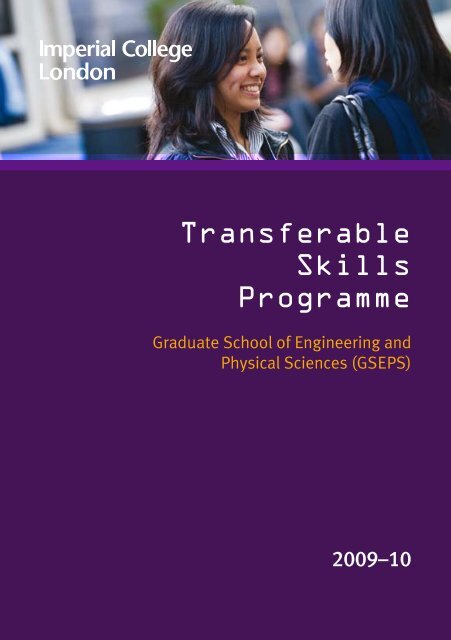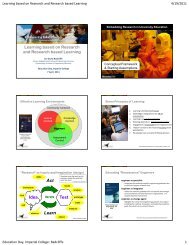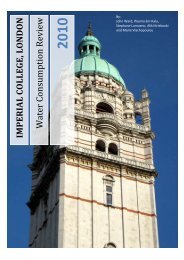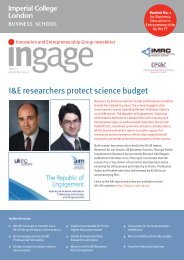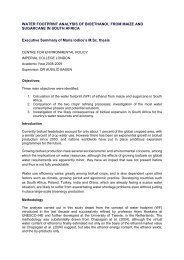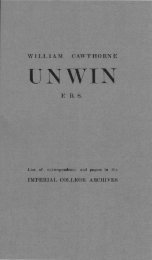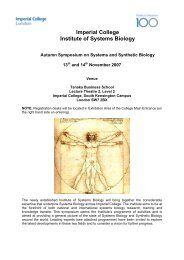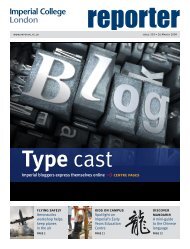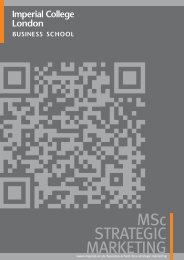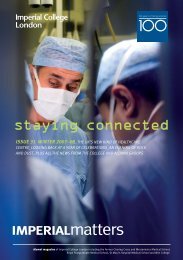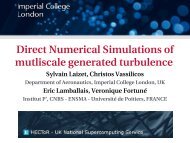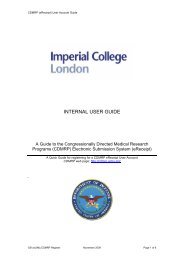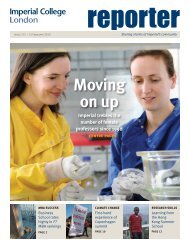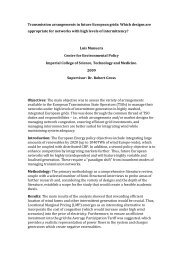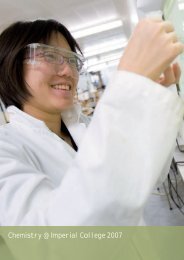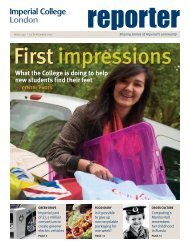Transferable Skills Programme - Imperial College London
Transferable Skills Programme - Imperial College London
Transferable Skills Programme - Imperial College London
You also want an ePaper? Increase the reach of your titles
YUMPU automatically turns print PDFs into web optimized ePapers that Google loves.
<strong>Transferable</strong><br />
<strong>Skills</strong><br />
<strong>Programme</strong><br />
Graduate School of Engineering and<br />
Physical Sciences (GSEPS)<br />
2009–10
Graduate School of Engineering and Physical Sciences (GSEPS)<br />
GSEPS has an overarching responsibility for postgraduate education and research<br />
in engineering and physical sciences and in the Business School. The Director is<br />
Professor Richard Kitney OBE, FREng, DSc(Eng), FCGI.<br />
Students from the following departments belong to GSEPS:<br />
+ + + Aeronautics<br />
+ + + Bioengineering<br />
+ + + Centre for Environmental Policy<br />
+ + + Chemical Engineering and Chemical Technology<br />
+ + + Chemistry<br />
+ + + Civil and Environmental Engineering<br />
+ + + Computing<br />
+ + + Earth Science and Engineering<br />
+ + + Electrical and Electronic Engineering<br />
+ + + <strong>Imperial</strong> <strong>College</strong> Business School<br />
+ + + Institute of Biomedical Engineering<br />
+ + + Materials<br />
+ + + Mathematics<br />
+ + + Mechanical Engineering<br />
+ + + Physics<br />
If your department is not listed, you will be a member of the Graduate School of<br />
Life Sciences and Medicine (GSLSM).<br />
> The Graduate<br />
Schools were<br />
nationally<br />
recognised in<br />
2006 and 2008,<br />
winning the<br />
Times Higher<br />
Education Award<br />
for Outstanding<br />
Support for<br />
Early Careers<br />
Researchers.<br />
“On behalf of everyone at <strong>Imperial</strong>,<br />
I am delighted to welcome you to<br />
our vibrant and diverse community.<br />
As a postgraduate, you<br />
automatically become a member of<br />
one of the <strong>College</strong>’s two Graduate<br />
Schools, which oversee the quality<br />
of our teaching and research and<br />
provide a suite of transferable<br />
skills courses that will help you<br />
to succeed in your studies and<br />
your career. They also organise a<br />
number of interdisciplinary events<br />
and activities, giving you a chance<br />
to get to know your peers beyond<br />
your particular course or discipline.<br />
The benefits of this are social as well as professional, so I would<br />
encourage you to take advantage of everything that the Schools have<br />
to offer. I hope you will find that doing so enhances both your time at<br />
<strong>Imperial</strong> and your career over the years to come.”<br />
Sir Roy Anderson, Rector<br />
1
The Graduate School of<br />
Engineering and Physical<br />
Sciences (GSEPS)<br />
Developing your<br />
transferable skills<br />
“Welcome to the Graduate School of Engineering and Physical Sciences. I’m<br />
sure you will find our <strong>Transferable</strong> <strong>Skills</strong> <strong>Programme</strong> a useful complement<br />
for your studies and an aid to both your academic and personal<br />
effectiveness. Our comprehensive training has been designed to meet the<br />
needs of our diverse student population whatever their background or<br />
experience. In GSEPS we recognise that individuals must take responsibility for their own<br />
development, and I am confident you will see the benefits the training provides and will fully<br />
engage with it. I hope you enjoy being part of GSEPS and I wish you every success at <strong>Imperial</strong><br />
and beyond.”<br />
<strong>Transferable</strong> <strong>Skills</strong> <strong>Programme</strong><br />
We understand research students and their<br />
needs and this means we are ideally placed to<br />
offer a generic transferable skills programme<br />
which encourages your development beyond the<br />
academic training provided by your department.<br />
Our large suite of transferable skills training<br />
courses covers a number of core skill areas,<br />
including:<br />
— Research skills and techniques<br />
— Research environment<br />
— Research management<br />
— Personal effectiveness<br />
— Communication skills<br />
— Networking and team working<br />
— Business, commercialisation and<br />
entrepreneurship skills<br />
— Career management<br />
—Professor Richard Kitney, GSEPS Director<br />
GSEPS events<br />
GSEPS arranges a number of special events<br />
throughout the year to encourage interdisciplinary<br />
discussion. Events include:<br />
—Welcome reception for new students<br />
—Distinguished guest lectures<br />
—Networking events<br />
—Debates and panel discussions<br />
—Annual chemistry show<br />
—Ig Nobel Tour Show<br />
—Inter-Graduate School quizzes<br />
—Research symposium including a poster<br />
competition<br />
See page 16 for further details.<br />
> “Research students<br />
can often feel<br />
a bit isolated,<br />
working in the labs<br />
by themselves.<br />
The Graduate<br />
Schools’ events<br />
are a good social<br />
and networking<br />
opportunity.”<br />
—Haytham,<br />
Mech Eng<br />
Why does <strong>Imperial</strong> have transferable<br />
skills training?<br />
<strong>Imperial</strong> is dedicated to providing<br />
world class education and transferable<br />
skills training helps prepare students<br />
for creative and leadership roles in<br />
worldwide industry, academia and the<br />
public sector.<br />
You will receive research-specific<br />
training from your department, while<br />
generic training is provided by GSEPS.<br />
The GSEPS courses are designed to<br />
support your personal development,<br />
help you to improve your ability to<br />
undertake focused research, and to<br />
enter and progress in your chosen<br />
career. They can also help to develop<br />
your understanding of the ethical and<br />
commercial dimensions of science in<br />
the wider world, and enable you to<br />
communicate your work effectively to<br />
a variety of audiences. Importantly,<br />
the workshops provide an invaluable<br />
opportunity to meet and interact with<br />
students from other disciplines across<br />
the <strong>College</strong>.<br />
Master’s students are also welcome<br />
to attend appropriate courses on our<br />
programme.<br />
What is the GSEPS <strong>Transferable</strong> <strong>Skills</strong><br />
<strong>Programme</strong>?<br />
It is a programme of workshops in<br />
research, professional, developmental<br />
and employability skills for our<br />
postgraduates. The courses vary in<br />
length and format, from one-hour<br />
lectures to three-day interactive<br />
workshops. There are also a number of<br />
online courses available.<br />
Courses are free to attend but please<br />
note there is a cancellation policy (see<br />
page 15).<br />
2 3
Taking part<br />
> GSEPS offers the<br />
skills and tools to<br />
help you in your<br />
research, and<br />
your life beyond<br />
<strong>Imperial</strong>.<br />
Who delivers the <strong>Transferable</strong> <strong>Skills</strong><br />
<strong>Programme</strong>?<br />
We have a dedicated tutor team<br />
who are committed to developing<br />
the effectiveness of the programme.<br />
They manage the Research <strong>Skills</strong><br />
Development (RSD) course and Your<br />
PhD: Finish Up and Move On (FUMO),<br />
as well as a number of our shorter<br />
workshops. We also employ a team<br />
of highly skilled and experienced<br />
trainers to lead other workshops. The<br />
team includes <strong>Imperial</strong> academic staff<br />
as well as external consultants. All<br />
tutors have academic and/or industrial<br />
experience.<br />
We also work closely with institutions<br />
and services such as the British<br />
Library, the British Science Association,<br />
the Royal <strong>College</strong> of Art and Vitae (the<br />
national organisation which supports<br />
researchers and post-docs), as well<br />
as <strong>Imperial</strong>’s Library, Careers Advisory<br />
Service and Business School, to bring<br />
you a wide range of expertise and<br />
knowledge.<br />
Who supports us?<br />
The GSEPS programme is supported<br />
by the Research Councils:<br />
• Biotechnology and Biological<br />
Sciences Research Council (BBSRC)<br />
• Engineering and Physical Sciences<br />
Research Council (EPSRC)<br />
• Natural Environment Research<br />
Council (NERC)<br />
• Medical Research Council (MRC)<br />
• Science and Technology Facilities<br />
Council (STFC)<br />
• Economic and Social Research<br />
Council (ESRC)<br />
The Graduate Schools were nationally<br />
recognised in 2006 and 2008, winning<br />
the Times Higher Education Award<br />
for Outstanding Support for Early<br />
Careers Researchers. The programme<br />
is also endorsed by employers who<br />
feel our programme enhances the<br />
employability of <strong>Imperial</strong> graduates.<br />
Is there an attendance requirement?<br />
Yes. The GSEPS <strong>Transferable</strong> <strong>Skills</strong><br />
<strong>Programme</strong> is an integral part of your<br />
research degree training and you<br />
should use it to improve and expand<br />
your abilities. The programme is<br />
divided into core (A list) and posttransfer<br />
or special interest (B list)<br />
courses – see page 8–9.<br />
All first year research students are<br />
normally required to take four A<br />
list courses or the Research <strong>Skills</strong><br />
Development (RSD) course plus one<br />
further course from the A or B list<br />
before transfer from MPhil to PhD. We<br />
strongly recommend you attend the<br />
three-day residential RSD course – see<br />
page 12.<br />
There is no limit to the number of<br />
courses you can attend. Once you<br />
have completed your attendance<br />
requirement you are encouraged to<br />
use the programme to further your<br />
personal and research effectiveness<br />
and employability.<br />
As well as courses delivered directly<br />
by GSEPS we recognise a number<br />
of courses offered elsewhere as<br />
equivalent courses and we also give<br />
credit for prior learning (see page 10).<br />
Does GSEPS provide training for<br />
Master’s students?<br />
Yes. Students registered for all<br />
Master’s courses (MSc, MRes<br />
and MBA) are welcome to attend<br />
appropriate GSEPS workshops.<br />
There are also a number of courses<br />
specifically designed for these<br />
students. GSEPS does not require<br />
Master’s students to attend our<br />
training programme although your<br />
department may require you to attend<br />
a number of workshops as part of your<br />
course.<br />
Will I get a record of courses<br />
attended?<br />
Yes. A record is available from GSEPS<br />
on request. Certificates can be<br />
provided at the end of your studies.<br />
This can form part of your CV and can<br />
be shown to prospective employers.<br />
Your department is regularly notified<br />
of your GSEPS course attendance.<br />
4 5
Our courses<br />
> “The course was<br />
worth attending.<br />
It has really<br />
influenced my<br />
understanding<br />
of writing a<br />
paper, a thesis<br />
etc. in a great<br />
way.” —Kritika,<br />
Chemistry, on<br />
Technical Writing<br />
Lecture Series<br />
“Professional,<br />
well delivered<br />
with practical<br />
presentation<br />
tips.” —Hau Sze,<br />
Mathematics, on<br />
Presentation <strong>Skills</strong><br />
Where can I find details of the<br />
courses?<br />
On the GSEPS website and Blackboard<br />
site.<br />
• www.imperial.ac.uk/gseps<br />
To log in to the Blackboard site go to<br />
• http://learn.imperial.ac.uk/<br />
and enter your <strong>College</strong> username and<br />
password. You should automatically<br />
have access to the GSEPS sites but if<br />
not please email us at<br />
graduate.schools@imperial.ac.uk<br />
with your <strong>College</strong> username and you<br />
will be given access.<br />
The GSEPS Blackboard site is a<br />
password-protected intranet site for<br />
<strong>Imperial</strong> students and staff, containing<br />
course outlines, course materials,<br />
helpsheets, the timetable and booking<br />
instructions. There are also news and<br />
events pages, and useful links for<br />
postgraduate study. We encourage you<br />
to check the sites frequently for the<br />
most up to date information.<br />
Needs Analysis Questionnaire<br />
You can tailor the GSEPS programme<br />
to your specific needs by using our<br />
Needs Analysis Questionnaire. The<br />
online questionnaire highlights the<br />
key transferable skills relevant to you<br />
and helps you to focus your personal<br />
development planning. All relevant<br />
Graduate School workshops as well as<br />
other <strong>College</strong> and external resources<br />
are listed.<br />
Responses are stored anonymously<br />
for statistical purposes so the<br />
questionnaire is completely<br />
confidential and can be repeated as<br />
many times as you need.<br />
You can find the questionnaire within<br />
the GSEPS Blackboard site by selecting<br />
Needs Analysis from the menu. Log<br />
in at:<br />
• http://learn.imperial.ac.uk<br />
Student feedback<br />
At the end of each workshop you<br />
have the opportunity complete an<br />
evaluation form. We also run focus<br />
groups which give you the chance<br />
to feed back on the programme<br />
as a whole and suggest possible<br />
developments. We are always<br />
interested in your views and<br />
suggestions so please do not hesitate<br />
to get in touch.<br />
Graduate School of Engineering and<br />
Physical Sciences requirements<br />
Before transfer to PhD, all research<br />
students and RAs are required to<br />
attend:<br />
• four A list courses<br />
OR<br />
• the Research <strong>Skills</strong> Development<br />
(RSD) course and one further<br />
course from the A or B list.<br />
All Master’s students (MSc, MRes<br />
and MBA) are welcome to attend<br />
appropriate workshops.<br />
What does the A and B list mean?<br />
The GSEPS <strong>Transferable</strong> <strong>Skills</strong><br />
<strong>Programme</strong> is divided into A list<br />
(core) and B list (post-transfer and/or<br />
specialist) courses.<br />
• A list courses are appropriate at<br />
any time during your PhD, but are<br />
particularly suitable for pretransfer<br />
students. These provide<br />
the fundamental skills to help you<br />
in your research and development.<br />
• B list courses cover a range of<br />
topics, many of which are either<br />
suited to post-transfer or are<br />
courses which are of a specialised<br />
nature so are not considered<br />
essential for all PhD students.<br />
We recommend that you always read<br />
the full course description as this will<br />
give you the learning objectives for<br />
each session and tell you the most<br />
appropriate point in your PhD to<br />
attend the workshop.<br />
The GSEPS transfer requirement<br />
ensures that all research students<br />
receive some transferable skills<br />
training. It is deliberately kept<br />
low to allow you to take overall<br />
responsibility for your own training<br />
and development.<br />
6 7
Before transfer to PhD, all research<br />
students and RAs are required to<br />
attend:<br />
• four A list courses<br />
OR<br />
• the Research <strong>Skills</strong> Development<br />
(RSD) course and one further<br />
course from the A or B list.<br />
All Master’s students (MSc, MRes<br />
and MBA) are welcome to attend<br />
appropriate workshops. Please see<br />
individual course outlines for details.<br />
A List • Core<br />
B List<br />
Research <strong>Skills</strong> Development (RSD)<br />
Personal effectiveness<br />
Assertiveness<br />
Creativity and Ideas Generation<br />
Effective Communication<br />
Motivation for PhD students<br />
Myers Briggs: Introduction<br />
Myers Briggs: Personality and Communication<br />
Myers Briggs: Careers<br />
Networking<br />
Stress Management: Postgraduate Study and<br />
Beyond<br />
Time Management Made Simple<br />
Presentation and communication skills<br />
Advanced Presentation <strong>Skills</strong><br />
Effective Poster Presentations<br />
Practical Presenting for Conferences<br />
Presentation <strong>Skills</strong><br />
Presenting: Developing Natural Ability<br />
Science and the Media<br />
Stand and Deliver: Presenting an Academic<br />
Conference Paper<br />
Technical Presentations Masterclass<br />
Research effectiveness<br />
Becoming an Effective Researcher<br />
Efficient Reading<br />
Information Retrieval<br />
Negotiation <strong>Skills</strong> for Researchers<br />
Project Management for Researchers<br />
Project Managing Your Thesis<br />
Research Ethics<br />
Statistics<br />
Stats from Scratch: An Introduction to Statistics<br />
Stats for Research: Intermediate Statistics<br />
Writing skills<br />
Effective Academic Writing: Developing an<br />
Effective PhD<br />
Tackling a Literature Review<br />
Technical Writing Lecture Series<br />
Technical Writing Two Hour Workshop<br />
Writing for Publication<br />
Business and commercialisation skills<br />
Commercialisation of Research<br />
Design-Led Innovation<br />
Developing Enterprise <strong>Skills</strong><br />
Entrepreneurship Three-Day Workshop<br />
Intellectual Property and Its Importance to<br />
Researchers<br />
Introduction to Accounting<br />
Introduction to Entrepreneurship<br />
Introduction to Marketing<br />
Introduction to Organisations<br />
Introduction to Strategy<br />
Keeping going<br />
Motivation and Independence for Researchers<br />
Relax About Writing<br />
Information skills<br />
EndNote<br />
The Information Landscape: Introducing ISI Web<br />
of Knowledge<br />
The Information Landscape: Keeping Ahead in<br />
the Information Game<br />
Careers workshops<br />
Career Focus for the Future<br />
Career Strategies for PhD<br />
Interview Practice with Video Playback<br />
Job Search with a Difference<br />
Succeeding at Interview<br />
Working in the UK for International (Non-EU)<br />
Students<br />
Writing Effective Applications and CVs<br />
Completing the PhD<br />
Preparing for Leadership<br />
Your PhD: Finish Up and Move On (FUMO)<br />
Your PhD: The Last Lap<br />
Personal effectiveness for MSc Students<br />
Interpersonal <strong>Skills</strong> for MSc Students<br />
Negotiation and Influencing <strong>Skills</strong> for MSc<br />
Students<br />
For information on equivalent courses run by<br />
departments and support services please see<br />
page 10.<br />
8 9
Other Graduate<br />
School resources<br />
> “GSEPS encourages<br />
postgrads to think<br />
about their careers<br />
and life beyond<br />
university from early<br />
in their studies. This<br />
is something we<br />
particularly like about<br />
<strong>Imperial</strong>.”<br />
—Nicholas Creswell,<br />
University <strong>Programme</strong>s<br />
Manager,<br />
Google EMEA<br />
Can I be given credit for external<br />
courses or for previous learning/<br />
experience?<br />
Yes. We acknowledge the diversity<br />
of experience amongst our student<br />
population and this is why we offer a<br />
mechanism for recognising training<br />
courses offered elsewhere and for<br />
significant prior learning or experience.<br />
You can apply for courses to count<br />
towards all or part of the transferable<br />
skills transfer requirement. Full details<br />
of equivalence and how to apply are on<br />
the GSEPS Blackboard site:<br />
• http://learn.imperial.ac.uk<br />
The GSEPS <strong>Programme</strong> is designed<br />
to support you throughout your PhD<br />
and whatever your background or<br />
experience, there is something for you.<br />
The Needs Analysis Questionnaire is<br />
there to help you recognise your skills<br />
base and identify suitable courses<br />
(see page 6).<br />
Does departmental training count<br />
toward the transferable skills<br />
requirement?<br />
There may be some courses available<br />
from your department that already<br />
•<br />
have equivalent status.<br />
Support services such as the<br />
Statistical Advisory Service (SAS)<br />
and Information and Communication<br />
Technologies (ICT) offer some<br />
equivalent B list courses too. Please<br />
note that as these courses are not<br />
provided by GSEPS there may be a fee<br />
for attending. Students should ask<br />
their department to cover the fees for<br />
these courses.<br />
A full list of these courses is available<br />
on the GSEPS website and Blackboard<br />
site.<br />
Helpsheets<br />
GSEPS has a number of helpsheets<br />
which provide general guidance<br />
and tips. Helpsheets include<br />
advice on literature reviews, poster<br />
presentations and career planning, and<br />
can be found in the Course Materials<br />
section of the GSEPS Blackboard site.<br />
<strong>Skills</strong> Surgery<br />
If you have a question about the<br />
<strong>Transferable</strong> <strong>Skills</strong> <strong>Programme</strong> or<br />
would like some guidance on which<br />
GSEPS courses to choose, then you<br />
can book an appointment at one of our<br />
<strong>Skills</strong> Surgeries and a member of the<br />
Graduate School team will be happy<br />
to help you. To book an appointment<br />
or to ask a question, please email<br />
graduate.schools@imperial.ac.uk<br />
Mathematics Advisory Service<br />
The Mathematics Advisory Service,<br />
funded by the Graduate Schools, is<br />
free for all research students and<br />
offers technical help to overcome<br />
mathematical problems you may<br />
encounter in your research. The Service<br />
is informal, friendly and effective.<br />
For details, follow the link to the<br />
Mathematics Advisory Service from:<br />
• www.imperial.ac.uk/<br />
graduateschools<br />
Online courses<br />
The Graduate Schools provide<br />
a number of online courses and<br />
resources within the Blackboard site.<br />
The following courses are currently<br />
available to all postgraduate students:<br />
• Attending Conferences, Presenting<br />
and Networking<br />
• Career Planning in the Sciences<br />
• Ethics: Good Research Practice<br />
• Ethics: Working with Human Subjects<br />
• Getting Published in the Sciences<br />
• Intellectual Property in the Research<br />
Context<br />
• IT and Statistics Basics<br />
• Project Management in the Research<br />
Context<br />
10<br />
11
Research <strong>Skills</strong><br />
Development (RSD) course<br />
“I consider the Graduate Schools’ Research <strong>Skills</strong> Development course<br />
to be invaluable for first year PhD students. The course focuses on<br />
the skills needed for managing your PhD and enhancing your research<br />
effectiveness. It really delivers results.”<br />
—Sir Roy Anderson, Rector<br />
> “I really enjoyed the<br />
course – it was really<br />
valuable and I think<br />
it will give me a lot<br />
more confidence<br />
to proceed with<br />
my PhD.”<br />
“It was useful<br />
to approach the<br />
concepts, issues<br />
and challenges of<br />
doing a PhD from<br />
a different angle.<br />
Really good to meet<br />
students from other<br />
departments in<br />
<strong>Imperial</strong>”<br />
“A valuable,<br />
pertinent and well<br />
organised event<br />
that encourages<br />
deep learning in<br />
a fun and relaxed<br />
environment.”<br />
“Really well<br />
organised and<br />
coherently put<br />
together. Great stuff.”<br />
The RSD course is a three-day<br />
residential course for all research<br />
students who are between three<br />
months and two years into their PhD.<br />
You will participate in a series of<br />
activities designed to enhance your<br />
personal and research effectiveness. It<br />
is an excellent opportunity to get away<br />
from <strong>London</strong>, interact with students<br />
from other disciplines and have<br />
fun. Students who take this course<br />
invariably stay in touch enabling them<br />
to create a valuable social network.<br />
Topics include planning, project<br />
management, creativity in research,<br />
communication skills, group dynamics,<br />
networking and developing selfawareness.<br />
You will enjoy a number<br />
of exciting but challenging indoor and<br />
outdoor activities.<br />
This course was awarded the<br />
Times Higher Education Award for<br />
Outstanding Support to Early Careers<br />
Researchers in 2006.<br />
All your travel and accommodation<br />
expenses are paid by the Graduate<br />
Schools and all meals are provided.<br />
The course is completely free to<br />
attend—it will cost you nothing<br />
but your time. The results are very<br />
rewarding!<br />
Easthampstead Park<br />
The venue for this course is<br />
Easthampstead Park, a Victorian<br />
country mansion situated within<br />
60 acres of beautiful parkland.<br />
Easthampstead Park is close to<br />
Bracknell and Wokingham railway<br />
stations and only 38 miles from central<br />
<strong>London</strong>, approximately one hour by<br />
train from Waterloo or Paddington.<br />
Course dates<br />
27–30 October 2009<br />
24–27 November 2009<br />
12–15 January 2010<br />
2–5 February 2010<br />
2–5 March 2010<br />
16–19 March 2010<br />
13–16 April 2010<br />
18–21 May 2010<br />
15–18 June 2010<br />
12 13
Post-transfer students<br />
Booking information<br />
> “The course is<br />
very useful and I<br />
would recommend<br />
to anyone else in<br />
their third year.”<br />
—Adam de Smith,<br />
Medicine, on<br />
FUMO<br />
What courses are available for posttransfer<br />
students?<br />
GSEPS has a number of workshops<br />
designed especially for students in<br />
their second year and above. We offer<br />
workshops on thesis writing, preparing<br />
for the viva, leadership, careers and<br />
introduction to business courses.<br />
There is also a two-day course called<br />
Your PhD: Finish Up and Move on<br />
(FUMO), for all final year students.<br />
In 2008 this course won the<br />
Times Higher Education Award for<br />
Outstanding Support for Early Careers<br />
Researchers.<br />
Your PhD: Finish Up and Move On<br />
(FUMO)<br />
This two-day intensive, interactive,<br />
non-residential course is for final year<br />
research students from both Graduate<br />
Schools. It covers what you need to<br />
know to successfully complete your<br />
PhD and move on to the next phase of<br />
your career. The two-day programme<br />
is full and varied including time for<br />
discussion, reflection and practical<br />
exercises. There are also talks from<br />
alumni about their experiences of<br />
completing the PhD and entering the<br />
job market.<br />
The course covers the following topics:<br />
• PhD thesis: Structuring your thesis,<br />
managing the writing, what to write,<br />
shaping the narrative of your thesis<br />
• PhD viva: What to expect, how to<br />
prepare, being successful<br />
• Careers: How to do decide what<br />
to do, discovering career options,<br />
networking, preparing for successful<br />
transitions<br />
• Leadership: <strong>Skills</strong> and qualities<br />
of leaders, practical exercises to<br />
develop leadership skills<br />
At the end of the first day, a small<br />
reception and networking event gives<br />
you the opportunity to talk to other<br />
students, employers, alumni and<br />
the tutors in a relaxed and friendly<br />
atmosphere. This course is held at the<br />
South Kensington Campus.<br />
Course dates<br />
14–15 October 2009<br />
3–4 December 2009<br />
17–18 February 2010<br />
25–26 March 2010<br />
26–27 May 2010<br />
24–25 June 2010<br />
How do I book?<br />
See your Blackboard site or the GSEPS<br />
website for information and booking<br />
instructions:<br />
• http://learn.imperial.ac.uk<br />
• www.imperial.ac.uk/gseps<br />
We recommend you discuss your<br />
choice of courses with your supervisor.<br />
When we have received your booking<br />
form we will send a confirmation email<br />
to you with venue details. We send a<br />
reminder email about a week before<br />
each course but please do not rely on<br />
this service.<br />
Cancellations<br />
There is a charge for late cancellations<br />
and non-attendance of courses.<br />
For our short courses, we ask for<br />
at least three working days’ notice<br />
of cancellation, so that places<br />
can be offered to other students.<br />
Cancellation periods for residential<br />
and longer courses can vary.<br />
Please see the GSEPS website and<br />
Blackboard site for full details of the<br />
cancellation policy and charges.<br />
14 15
events<br />
GSEPS events<br />
GSEPS arranges a number of social<br />
and academic events throughout the<br />
year, including a welcome event for<br />
new research students in October,<br />
networking receptions, distinguished<br />
guest lectures and events throughout<br />
the year. Previous guest lectures have<br />
included:<br />
• Professor Jared Diamond, Collapse:<br />
How Societies Choose to Fail or<br />
Survive<br />
• Dr Peter Evans, Let’s Put the Wagons<br />
in a Circle: Interacting with the Media<br />
• Professor John Pendry, Invisible<br />
Cloak and a Perfect Lens<br />
During National Science and<br />
Engineering week in March, we host<br />
the extremely popular Ig Nobel Awards<br />
Tour Show. Each May we hold an<br />
annual postgraduate event with an<br />
exhibition chemistry show. There is<br />
also the GSEPS Research Symposium<br />
for doctoral students in July which<br />
includes a poster competition, guest<br />
lecture, prize-giving and reception.<br />
Other special events, such as debates,<br />
lectures and quizzes are arranged<br />
throughout the year.<br />
Dates for your diary<br />
• Life as a Research Student<br />
Talk and Reception<br />
—Tuesday 13 October 2009<br />
• Postgraduate Study Opportunities<br />
Open Day—Wednesday 9 December<br />
2009. This is a chance for Master’s<br />
students who are considering doing<br />
a PhD, to meet representatives from<br />
all departments and discuss their<br />
options.<br />
• Ig Nobel Awards Tour Show<br />
—Thursday 18 March 2010<br />
• Annual Postgraduate Event<br />
—Friday 7 May 2010<br />
• GSEPS Research Symposium<br />
—Tuesday 13 July 2010<br />
These events are a means to broaden<br />
and enrich your experience at <strong>Imperial</strong><br />
through interaction with students<br />
across all disciplines. Full details of<br />
all events are available on the GSEPS<br />
website and Blackboard site.<br />
Contact us<br />
Room 560, Level 5, Sherfield Building.<br />
The office is open 9.30–17.00 Monday to Friday.<br />
Email<br />
graduate.schools@imperial.ac.uk<br />
Telephone +44 (0)20 7594 1383<br />
Fax +44 (0)20 7594 5025<br />
Web<br />
www.imperial.ac.uk/gseps<br />
16<br />
©2009 Designed by Communications, <strong>Imperial</strong> <strong>College</strong> <strong>London</strong>
www.imperial.ac.uk/gseps


